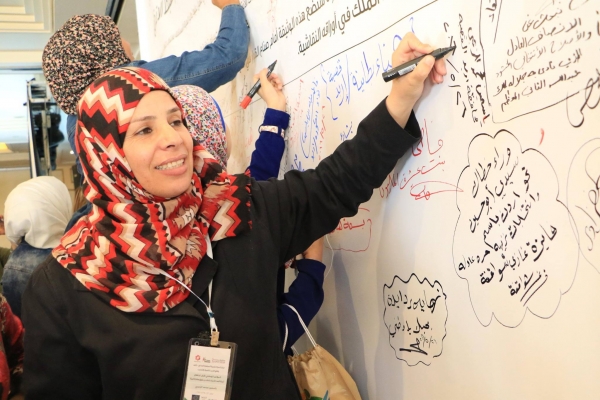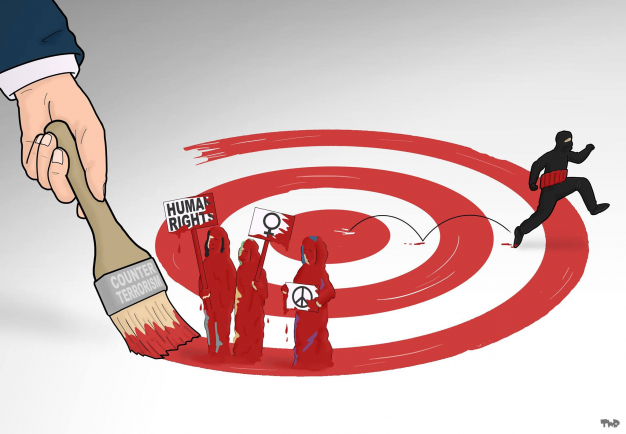Part 1 of The Interview with Mai E’leimat from Al Hayat Center for Civil Society Development
Interview conducted by WPP Staff
Mrs. Mai E'leimat is the Co-founder and the Head of Strategy and Research at Al-Hayat Center for Civil Society Development. Mrs. E’leimat has over 10 years of experience in research, project management and evaluation and strategy building. Her most recent researches and works included: The UN Women Research on Women and Violent Radicalization in Jordan; Monitoring Jordan’s first Action Plan for the Open Government Partnership; IRM report 2012-2013, and the second Action Plan; IRM report 2014-2015. She has also worked on the Evaluation of the National Strategy for the Jordan Higher Council for Affairs of Persons with Disabilities 2010-2015. Currently, she is leading two programs at Al-Hayat Center: “Monitoring Jordan National Integrity System Plan” and “Building Partnership among Religious Leaders (Imam’s and Waedat) to Counter Violent Extremism in Jordan”. Mrs. E'leimat holds a Bachelor’s degree in Law, and a Bachelor’s degree in Science & Education.
In this two-part interview with Mai E’leimat, Co-founder and the Head of Strategy and Research at Al-Hayat Center for Civil Society Development, she discusses her experiences in working on Women, Peace and Security (WPS) in Jordan. Al Hayat has contributed to WPP’s 2017 MENA Consultation, and has been part of the WPP 2017 delegation to the Commission on the Status of Women in New York. In this article, Mrs. E’leimat tells us about the work of Al Hayat in Jordan, highlighting some of the major challenges and successes they have achieved in their work around WPS, good governance and Preventing/ Countering Violent Extremism (P/CVE), among others. In the second article, Mrs. E’leimat candidly opens up about the challenges in the funding landscape for civil society in Jordan, and how local NGO’s are coping.
Al Hayat Center for Civil Society Development works on the topics of accountability, governance and civic participation. We have been monitoring elections in Jordan since 2007 (with 4,000 observers in the last election), monitoring Parliament since 2009, and we have also been monitoring some of the governmental action plans on topics such as corruption and political reform. We also work on empowering women and young people in defending their political rights. This is done by means of civic education programs, organizing debates, and creating a network of women to defend their rights through civic participation.

We work a lot at the grassroots level, in every region in Jordan, facilitating dialogue between community members and decision makers. Al Hayat strives to improve the capacity of the municipalities, by providing in-depth policy analysis. In addition, we conduct analyses of the laws on elections, and any laws that are of public concern. Through this program, we have a wide national outreach. Jordan is divided in 12 governorates, and in each Al Hayat has a network of women’s organizations. In the last elections, 150 local community organizations joined our coalition for monitoring elections and Parliament. This construction also allows us to work directly on a decision-making level. For example, we work with the government by providing them with capacity building, and by helping them run consultations with civil society.
The volatile situation in the region has led us to begin working on the Preventing Violent Extremism (PVE) topic since 2013. There has been a lot of frustration in Jordan with some people from our communities joining these radical groups. The first action we did on this topic was to have a camp for civil society organizations (CSOs) and government officials to work together for solutions (online and offline), for initiatives on countering violent extremism (CVE) and promoting a culture of tolerance. Some examples of these actions are participatory theater programs and debate programs in schools.
Working in the field of peace and security has also lead Al Hayat to work on the gender aspects of peace and security, using UNSCR 1325. Hayat has assisted The Jordanian National Commission for Women (JNCW) in holding consultation sessions to develop the Jordanian National Action Plan on UNSCR 1325. We also conducted a study for UN Women on women and violent radicalization. In our research, we found that over 46% of respondents identify religious leaders as their first source of information. This shows that they are important actors to engage with in PVE efforts. Moving forward, we engaged 100 religious leaders along with 100 community activists (men and women), from all across Jordan in two training programs aimed at building partnerships between community activists and these leaders.
We do this through capacity building in messaging, community outreach, initiative design, using social media, designing debates and debate skills. We also engage in peer education sessions: both groups deliver the training together. The trainees then go back to their communities to provide trainings. People also do trainings during small gatherings at people’s houses, to overcome economic as well as social constraints. For example, some men are afraid to send their wives to the mosque or somewhere else to receive or provide training, and this way more women can be engaged. The outcomes so far have been very promising and important. Some programs only focus on training religious leaders, treating them as an isolated component. Yet we feel it is important to have them engage with community activists, and implement initiatives together. We provide the groups with the logistic and financial support to do so.
We need to mobilize the religious leaders to become community activists, because the people trust them. The Ministry of Endowment and Islamic Affairs is the body that nominates the participants. We worked with two groups for this program, and one of the criteria was that they had to have been in trainings before. The first group met this criterion, and they were initially more open than the second group, but even so, some still experienced difficulties. The second group was slightly more difficult, because they had never been in a training before. For some of them it was the first time leaving their home or going to a hotel. A challenge we faced was that some of the religious leaders did not want to work in mixed gender groups. Some did not want a female trainer, or objected to songs in the restaurants while having dinner. Some also had problems sitting for dinner with women, or seeing them smoke shisha. Some of them said they never thought that a family could sit together in a restaurant in an open place to have a meal together.
We managed to move those people to a place where they have an increased ability to reach out to their communities and are now more open to mixed gender groups. In the beginning the female religious leaders were very shy, because of the gender mixed nature of the group. They did not want to lead their groups, or present group results. Previously, they did not want to spend the night here without their husband; however, recently we noticed that they are not bringing a companion anymore.
The high level of commitment of those who attended the trainings is amazing. They stayed up until 5 AM working on the presentations. We have finished three trainings now. In the next training, we will be presenting - online and offline – some of the experiences of those working on community initiatives. Trainings like these, when done with the proper experience and care, through their multiplication effect and community engagement and focus, can help to reduce space for those with an extremist agenda. Soon we will be working on a program for teachers and school councilors.
Al Hayat Center for Civil Society Development is a non-governmental civil society organization established in 2006. Al Hayat aims to promote accountability, governance, public participation and tolerance in Jordan and the region within the framework of democracy, human rights, and the rule of law, taking into consideration gender mainstreaming in public policy and action. Al Hayat works through two main programs: Accountability, Local Governance and Participation (RASED; The Observer) program and Countering Radicalization program. Al Hayat Center has more than 10 years of experience in the field of training and legal research and analysis.
11 Dec '17 This month WPP staff interviewed Arbia Jebali and Sarah Chamekh from Free Sight Association in Tunisia about the work their organization does, how civil society space has changed over the years, which challenges they are facing now, and how civil society in Tunisia is organizing itself to overcome those challenges.
7 Nov '17 In this article, WPP staff interviewed Doron Joles of XminY Fund, an activist organization that supports social movements, action groups and changemakers fighting for a fair, democratic, sustainable and accepting world. He discusses the unique way they have chosen to hand out funds, and the challenges that go along with funding small activist organizations in the current global climate.

25 Oct '17 This Friday, the UNSCR 1325 Open Debate will take place once again, seventeen years since the adoption of landmark UN Security Council Resolution 1325 on Women, Peace and Security. In this article WPP staff reflects on the progress made for a truly transformative feminist peace agenda until now.
